
Contents
Overview
The Goal of Understanding Ego Death
Deliberately Postulating Coming Control-Loss
The Potential for Control Breakdown and Transformation
The Transcendent Solution to Restoring Viable Control
Sin as Misattribution of Control-Thoughts
Wrath, Compassion, and Making Peace
Sacrificing to End Battling the Thought-Source
Vertical Atonement for Rebellion-Guilt
The Sacred Marriage
The ego is the sense of being a metaphysically free, sovereign agent that originates and controls its own thoughts, actions, and movements of the will while moving through time and space.
Ego death is the cessation, in the intense mystic altered state, of the sense and feeling of being a control-wielding agent moving through time and space. The sensation of wielding control is replaced by the experience of being helplessly, powerlessly embedded in spacetime as purely a product of spacetime, with control-thoughts being perceptibly inserted or set into the stream of thought by a hidden, uncontrollable source.
Ego death leaves one’s initial, youthful “lie” behind. The “lie” is the confused mental worldmodel which assumes that oneself is the ultimate creator of one’s thoughts, actions, future, and movements of the will. The goal of testing control in the altered state is not to act out the loss of control in any way, but rather, to gain fundamental self-knowledge and correction of self-frustrating error and confusion. The goal of putting control to the test is to understand the nature and limits of control across time by exploring ideas of loss of control and transcendent restabilization of control.
The promise of increased power over oneself leads to realizing the logical impossibility of that mode of power, but produces instead a viable alternate conception, of secondary-level, reflected power. The vexing attempt to gain properly functioning self-control while holding a confused model of self-control ceases. The misleading sensation that the time-voyaging continuant agent is the originator of its power of will is recognized as a conventional misperception and mental oversimplification.

The image of the Lone Soul in Purgatory shows the soul as imprisoned in chains, purified in flames, and lifted up in redemptive release by transcendent power.
In Gnosticism, the completed initiate belongs to the Immovable Race and is able to stand stably in the face of overwhelming, autonomy-undermining controllership that emanates from the hidden, primary control-level. Insights about the limitations of personal control-power result in a wounding of pride, but the mind is otherwise unharmed, and made more durable (or “imperishable”). A personal control system becomes compatible with transcendence, or becomes “divinely approved”, when it repudiates the assumption that it can depend on its own internal power to save itself during a control-limit violation.
The religious path and method is to ingest entheogens; think about your self-control power; disprove the possibility of forceful cross-time control; then depend on transcendent power, rather than your own local power, to provide coherent self-control. This method of testing the limits of control transforms your ideas about self and control to conform to transcendent experiential dynamics, “conforming to the image of God”. The efficient method of enlightenment about the dynamics of control-agency is to test self-control power by deliberately supposing that loss-of-control is lying fated on the worldline ahead, and then struggling to use one’s personal control-power to avoid that potentially given control-loss event. The dissociative state makes it easy to examine the dynamics and limits of control-agency while thinking outside of the ingrained perspective.
The ability of one’s immediate self to violate the accustomed desires or will of one’s overall cross-time self, including overriding the accustomed self-preservation restraints, disproves the impression that the time-voyaging continuant control-agent ever was in control as the originator of personal thoughts. Exploring the limits of control across time reveals that the true origin of the movements of the will the whole time was a hidden transcendent source other than the self conceived of as a time-voyaging continuant control-agent.
What’s revealed in religious revelation is that our self-control power has the potential to be visibly canceled, and that one’s control-thoughts are given by a more ultimate source of control-power. The mind is directly drawn up into heaven on Elijah’s whirlwind or fire-chariot, by deliberately thinking about being helplessly, inevitably, and irresistibly drawn into the thought of near-future loss of control, while in the dissociative state.
After drinking mixed wine at the Last Supper, in the garden of Gethsemane prior to the court trial, Jesus began to be deeply distressed, amazed, and fearful, saying like an initiate who had to poison the lower self, “Father, remove this cup from me; yet not what I will, but what Thou wilt.” The mind’s local control-agency becomes distressed and apprehensive about whether and how it can retain control, upon turning attention around, perceptibly recognizing its vulnerability to thought-coercion and control-instability, and seeing the illusory aspect of personal autonomous power.
The mind is accustomed to assuming that the cross-time phantom-self can wield power over each time-slice self in the near future. When this assumption is explicitly recognized and tested, the onset of self-control seizure occurs. Ever-tighter, more forceful application of rationality that’s premised on the assumption of wielding control-power across time cannot save the control-system from this seizure. Testing our control-power and discovering our dependent puppet-like status entails deliberate disproof and self-cancellation of cross-time control, which can threaten to lead to panic attack, seizure, and self-destructive control-chaos.
Relying on one’s conventional power of control-logic and will, when fully developed and perfected, leads to system lock-up – the self-cancellation of personal control power. Demonic reason taken to its full development creates an impossible mess and gets itself tangled up, paralyzed in its own net of reasoning about control, power, and will.
King Pentheus resisted Dionysus, who was an intruding foreign ruler coming in from outside the king’s domain. Dionysus’ mad, divine power was undermining king Pentheus’ ruling power as the established sovereign. When king Pentheus resisted this competing power, he was tricked into participating in an ecstatic-state initiation excursion, was lifted and caught up helplessly in a tree, and was defeated and torn to pieces by his mother and other raving Dionysus worshippers.
One’s role as the independent creator and controller of one’s thoughts was an illusion. The current time-slice self or time-voyaging continuant self is helpless to control or restrain the future time-slice selves while playing with the idea of having, keeping, or losing control; the result is like an army of lookalike time-slice selves, fighting against each other.
‘Idol worship’, ‘pride’, or ‘vanity’ is the assumption that the power of egoic control agency is real and substantial. “Pride before the fall” is the futile attempt to depend on that doomed pseudo-power configuration to save oneself from the catastrophic failure of cybernetic self-control, a failure which is inherently, systemically entailed.
Julius Caesar was authorized for power by his seizures, and the bull in his military’s Mithraic mystery-cult was wounded in the side, so the figure of Jesus was shown as similarly authorized by the spear-wound in his side, and the figure of the apostle Paul was portrayed as suffering from seizures. The ability to make self-control seize or cancel itself dramatically is an afflicting thorn, hole, or wound in our side, the innate cybernetic governance-failure through which the new, transformed life is born. The new transcendence-aware self is given birth through the pride-killing disproof-wound in the side.
A different approach and solution is required, to restore order from the chaos of trying to use a self-dependence that’s based on incoherent premises. This solution provides a more robust basis than reliance on personal power wielded by the semi-illusory conventional self. Something that transcends personal control-power logic is needed to provide an alternative to the seized, useless logical scheme of egoic control power. After being shown this cybernetically fatal potential, a rescuing miracle of transcendent magic arrives from outside the system of egoic control-power logic.
The mind’s transcendent potential kicks in, realizing that the logic of control-agency power originated by the phantom self cannot be the solution to the very problem that such an inaccurate configuration generated in the first place. One must put one’s reliance on a self-existing faith, compassion, heart, love, or benevolent Holy Spirit, which cannot have any ordinary rational control-logic basis and that one does not experience as a product of one’s own egoic control-power or will, but is consciously experienced as being given by the hidden source of thoughts.
Solving the problem of true and justified mental order of personal self-government instead of control-chaos comes through a transcendent Zen jump. Depending on the egoic system of reasoning, which is constructed around inherently self-frustrating premises, ultimately leads to control lock-up and a catastrophically ineffective self-cancellation of control. Buddha recognized that his destiny was to touch the ground in an act of compassion and harmonious integration with the unity of the Ground of Being, causing Mara and his army of demons to instantly disperse – then he experienced enlightenment.
Viable and coherent control is provided by recognizing that personal control depends on transcendent givenness of your thoughts by a mysterious hidden source that ultimately caused the control lock-up and that independently saves your controllership, restoring it in a newly coherent form. The hidden source of thoughts that provides a viable, transcendent personal control system is personified as a merciful and compassionate God.
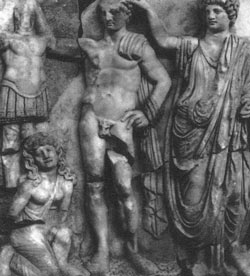
The figure of Caesar was plugged into the routinized mystery-cult format utilizing ‘mixed wine’. The imperial mystery cult incorporated themes related to imperial government, and had initiation rites for mystai using ‘mixed wine’ heavily, along with symposium drinking parties. Political themes were intermixed with mystic-state experiencing, as was common in ancient culture.
The defeat of egoic autonomy and power in the mystic ecstatic state was similar to the defeat of rebellious nations. Caesar was positioned as divinely authorized and led by Jupiter to bring peace, prosperity, and stable government across the entire world. The imperial mystery cult used parallels between Caesar's pardon of the rebellious kings when they sacrificed to him in homage and obeisance, and the sudden calm and restoration of stability that follows the mind’s sacrifice of the egoic claim of wielding autonomous power.
Our control-power has the Judas capability, which is the ability to betray the illusory aspect of personal power, through divine, transcendent power-seizure. By betraying our illusion of sovereignty, our Judas potential thereby delivers our lower, “rebellious” claim of independent kingship-power over to the transcendent level of governing power.

Lazarus is transcendently lifted up from ego-death control-power paralysis by Jesus as the representative of the separate, higher-level source of thoughts. Jesus told his disciples “Lazarus is dead, and for your sake I am glad I was not there, so that you may believe. But let us go to him.” Then Thomas (called Didymus, the twin) said to the rest of the disciples, “Let us also go, that we may die with him.”
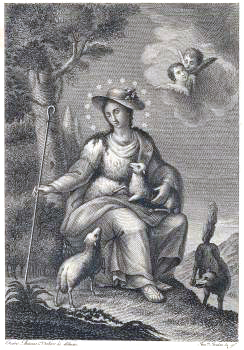
Maria the Divine Shepherdess of Souls, Divina Pastora, as benevolent and trustworthy thought-provider rescues and protects the person from the direly threatening wolf, which is the threat of loss of control or hostile control-usurpation by the hidden thought-source. The mind begins with a system of thinking about personal control that assumes independence, but personal control is only pseudo-independent. After being transcendently moved out from that doomed system of logic, one experiences the joyful sense of relief and thankfulness. The person, as a time-voyaging locus of control, has been rescued from certain peril, from outside their own local resources of control-power.
Upon initiation, the concept of ‘sin’ is reinterpreted and revised, producing a transformed mental model which understands ‘sin’ to be a logical error about the nature of control-agency and agent-culpability. Sin is a matter of understanding and meaning-shift. The secret of the kingdom of God has been given, but cloaked in double-meanings so that those on the outside may see and hear but not understand, lest they turn about and their sins be forgiven.
In mystic metaphor, misunderstanding moral agency is considered the fundamental sin and immorality; God was most angry about the king’s rebellious worship of idols that are fashioned out of created materials – a metaphor for taking pseudo-autonomous personal control-agency as though it were genuinely autonomous. Reformed theology affirms the predestination of who God gives salvific grace to, while holding to the moral culpability of created persons. This Augustinian compound model is not simply an inconsistent combination of beliefs; rather, it is a technique of metaphorical meaning-shifting that is bi-modal, designed to span and contrast the egoic and transcendent systems of thinking.
A person’s will appears to be originated and controlled by the time-voyaging continuant agent that’s projected out from each time-slice along the person’s timelessly frozen worldline. The conception of personal control agency that is built around this illusion is ‘sin’ and the ‘lie’.
‘Wrath’ means the threat that Fate or blind, machine-like determinism is ultimately in control of your coming thoughts but is set against your claim to exert independent power over your thoughts.
Mystic-state ‘compassion’ and ‘rescue that narrowly averts divine wrath’ means that that which ultimately gives you your thoughts is intimately united with you and is good or benevolent toward you, bringing you into a harmonious, reconciled, integrated relationship with the compassionate and beneficent controller of all that happens, including your own near-future thoughts.
The wrath/compassion polarity is portrayed as paired deities of wrath and compassion in Tibetan Buddhism; dual traits of the Creator (justice and mercy); and Jesus as harsh righteous judge with Mary as compassionate intercessor. The god of battling and the goddess of love – Ares and Aphrodite (or Mars and Venus) – were caught together in a near-invisible net, producing the child Harmonia (or Concordia).
Jupiter Optimus Maximus means ‘all-good’ and ‘all-powerful’, as is hoped for from a protective deity when one is vulnerable to awareness of Heimarmene in the intense mystic altered state.
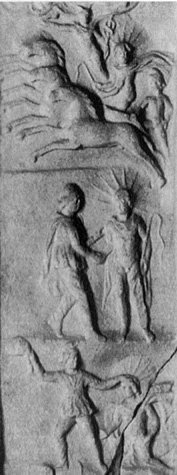
Mithras demonstrates that his arm wields control over the power of the bull’s shoulder. Sol is reconciled with Mithras in a pact, and given transcendent power. Sol becomes an authorized charioteer, steering the quadriga with Mithras, guided by Mercury (or Hermes), who is holding a Fatedness-snake on a time-pole.
‘Sacrifice’ is a mental attitude of cooperative dependence on that which gives thoughts, your will having been overcome and made to will its own demise as an empty delusion, turned against itself by now-revealed transcendent power. Sacrifice offers up and hands over your claim to effective independent power, as opposed to battling against your near-future self and the inherently overpowering source of all thoughts and movements of will.
Sacrificing your autonomy-claim, acknowledging your dependency on that which ultimately gives you your thoughts, brings mental peace and harmony and calms turmoil, because you are relieved from increasing your attempt to grasp and secure power over your own power; relieved from testing the power of your autonomy and the limits of your self-control thoughts.
Roman sacrificial altars are typically shown with a libation of concentrated, psychoactive unmixed wine being poured on the altar, which opens up a channel to the gods, along with the sacrificial animal such as the unresisting, cooperative bull. The sacrificer pouring the libation has a cloth behind the head, representing the spiritual ecstatic state, where awareness is positioned outside of the usual mind, perceiving its functioning.
Mithras overpowering and sacrificing the bull represents the delusion of self-originated control-power being given over to the transcendent level, with Mithras’ arm wielding the bull’s shoulder and his knife piercing and fatally wounding it. The wound in the bull’s side indicates Mithras demonstrating his power over the bull’s control-power. Mithras wrestles and overpowers the initiate’s control of their will, reconfiguring their understanding of control-power to account for the transcendent givenness of one’s thoughts.
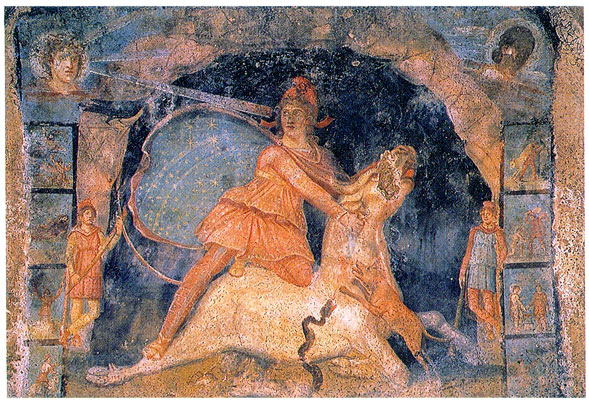
Sol represents the mind’s awareness, which in the dissociative state is positioned ecstatically outside the mind’s functioning. The mind is possessed and overtaken by Mithras. Pure awareness passively watches the sacrificial disproof of the mind’s claim to wield independent personal control-power.
A tauroctony fresco in a Mithraeum shows the self-command bull being sacrificed near the shoulder. A Heimarmene-snake is inevitably drawn toward ingesting the entheogenic blood; often the snake approaches a wine-mixing bowl below the bull instead. A blue-stemmed Psilocybe mushroom appears in Mithras’ leg and garment, with the stem proceeding through 7 steps, up to the stars. The billowing cape behind Mithras indicates the ecstatic state. The sphere of the fixed stars is shown on Mithra's cape, inside the underworld cave. The god forcefully pins the bull, who is paralyzed and unable to stand. Mithras’ feminine features indicate the soul abducted and married by divine power. Mithras turns to knowingly look back behind the conventional self-concept to see the source of thoughts and movements of the will.
Vicarious atonement entails a vertical shift upward of guilt and responsibility to a higher-level controller, not a horizontal shift sideways to a morally better person. A vertical 2-level legal and moral relationship applies to all controller/agent scenarios: master/slave, commander/soldier, potter/clay, puppetmaster/puppet, creator/creature, and virtual-world creator/virtual agent.
Releasing a prisoner who is a rebel slave (a false claimant to autonomy), and punishing a mock king in their stead by death sentence, is found in the Roman Saturnalia and in the mystic allegory of Jesus’ trial; the rebel Barabbas (son of father) is released.
The Jesus figure was portrayed in the New Testament as the earthly representation and manifestation of the Jewish creator God, who was defined as all-powerful and all-controlling. Jesus is held to be innocent in the sense of not himself rebelling against God; that is, he never mistook the pseudo-autonomy of personal control-agents as literal autonomy. However, given that he was the Creator’s representative figure within the created world, he was ultimately responsible or guilty for all instances of such ‘rebellion’ which did occur by other people.
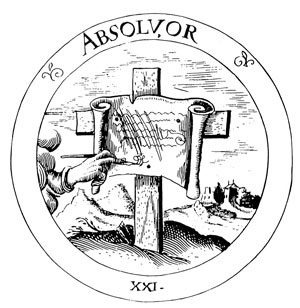
The dissociative-state revelation that higher-order power stands over the source of our control-thoughts is described as rendering the initiate no longer under the sentence of death, making them mature, washed clean, perfected, imperishable, or possessing eternal life, in that they have already died as an autonomous moral agent, following the pattern metaphorically expressed in the figure of Jesus. “Anyone who follows me must deny himself and take up his cross, for whoever loses his life for me will find it.”
Lucifer fell from heaven, as Adam fell, due to pride through the illusory power of his virtual free will. Justice that is consistent with this metaphorical meaning-mode requires that he suffer a virtual death-sentence for his rebellious autonomy-claim; this sin is “punished” in the appropriate sense through mystic-state ego death and thereby done away with. Justice about ultimate responsibility is thereby fulfilled, and the initial, youthful error about our independent self-command is corrected.
The sacred marriage or pact with the divine provides a transcendent personal control system that is viable and stable. The resulting personal control system is based on mature, refined understanding about personal control agency, instead of misperception and frustrating confusion. The sacred marriage integrates one’s personal control activity in the mundane realm with the transcendent realization that thoughts originate from outside one’s realm of control.
In the ancient Greek tradition, marriage incorporated the themes of abduction and death of the girl, together with entheogenic initiation. Similarly, Christ raptures-away and marries his Church, the initiated elect, as his bride.
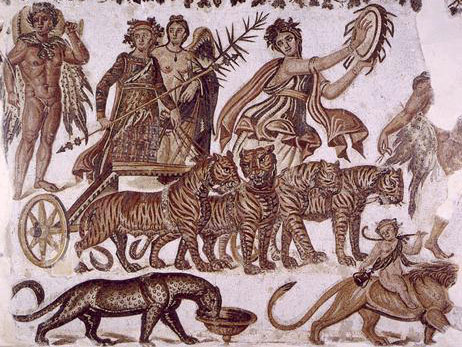
Dionysus rides with the abducted and married soul, Ariadne, in Dionysus’ victory procession, in a chariot drawn by four mushroom-tigers.
The uncontrollable, hidden, higher-level controller abducts and overtakes your innermost locus of control-power, as though that innermost wellspring of your thoughts is your generative organ, and ego death is the climax of the source of thoughts. This rapture of the soul by the divine realm gives birth to the new self that is married to the higher controller. The sacred marriage of the visible and hidden levels of control, producing new life, is celebrated in the wedding banquet with entheogenic mixed wine.
Up
Copyright © 2007 Michael Hoffman. All rights reserved.